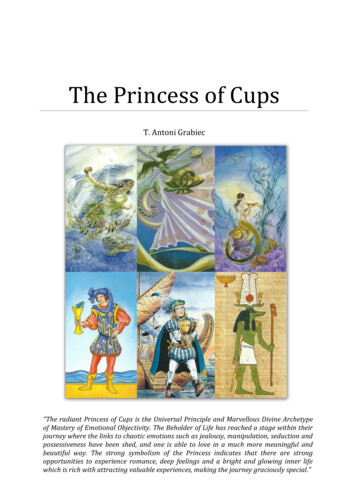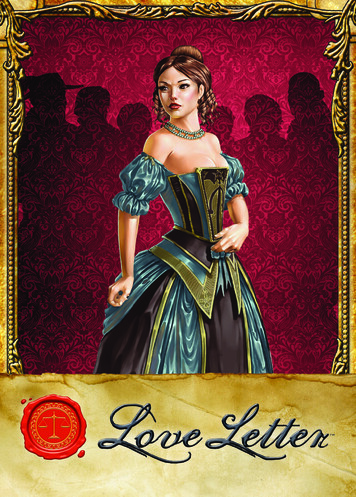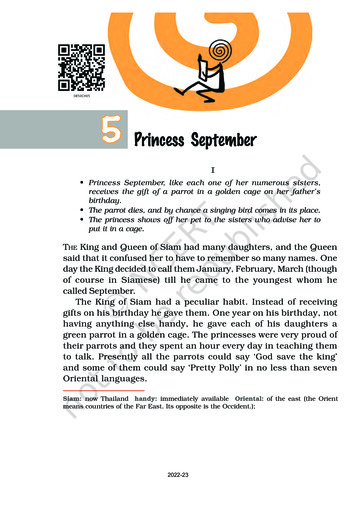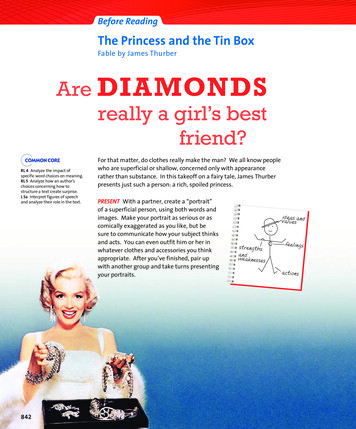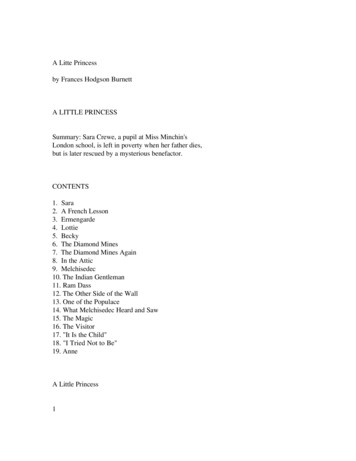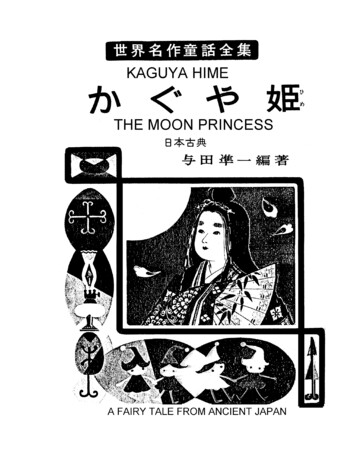
Transcription
The Princess and Curdieby George MacDonaldCONTENTS1 The Mountain2 The White Pigeon3 The Mistress of the Silver Moon4 Curdie's Father and Mother5 The Miners6 The Emerald7 What Is in a Name?8 Curdie's Mission9 Hands10 The Heath11 Lina12 More Creatures13 The Baker's Wife14 The Dogs of Gwyntystorm15 Derba and Barbara16 The Mattock17 The Wine Cellar18 The King's Kitchen19 The King's Chamber20 Counterplotting21 The Loaf22 The Lord Chamberlain23 Dr Kelman24 The Prophecy25 The Avengers26 The Vengeance27 More Vengeance28 The Preacher29 Barbara30 Peter31 The Sacrifice32 The King's Army
33 The Battle34 Judgement35 The EndCHAPTER 1The MountainCurdie was the son of Peter the miner. He lived with his fatherand mother in a cottage built on a mountain, and he worked with hisfather inside the mountain.A mountain is a strange and awful thing. In old times, withoutknowing so much of their strangeness and awfulness as we do, peoplewere yet more afraid of mountains. But then somehow they had notcome to see how beautiful they are as well as awful, and they hatedthem - and what people hate they must fear. Now that we havelearned to look at them with admiration, perhaps we do not feelquite awe enough of them. To me they are beautiful terrors.I will try to tell you what they are. They are portions of theheart of the earth that have escaped from the dungeon down below,and rushed up and out. For the heart of the earth is a greatwallowing mass, not of blood, as in the hearts of men and animals,but of glowing hot, melted metals and stones. And as our heartskeep us alive, so that great lump of heat keeps the earth alive: itis a huge power of buried sunlight - that is what it is.Now think: out of that cauldron, where all the bubbles would be asbig as the Alps if it could get room for its boiling, certainbubbles have bubbled out and escaped - up and away, and there theystand in the cool, cold sky - mountains. Think of the change, andyou will no more wonder that there should be something awful aboutthe very look of a mountain: from the darkness - for where thelight has nothing to shine upon, much the same as darkness - fromthe heat, from the endless tumult of boiling unrest - up, with asudden heavenward shoot, into the wind, and the cold, and thestarshine, and a cloak of snow that lies like ermine above theblue-green mail of the glaciers; and the great sun, theirgrandfather, up there in the sky; and their little old cold aunt,the moon, that comes wandering about the house at night; andeverlasting stillness, except for the wind that turns the rocks and
caverns into a roaring organ for the young archangels that arestudying how to let out the pent-up praises of their hearts, andthe molten music of the streams, rushing ever from the bosoms ofthe glaciers fresh born.Think, too, of the change in their own substance - no longer moltenand soft, heaving and glowing, but hard and shining and cold.Think of the creatures scampering over and burrowing in it, and thebirds building their nests upon it, and the trees growing out ofits sides, like hair to clothe it, and the lovely grass in thevalleys, and the gracious flowers even at the very edge of itsarmour of ice, like the rich embroidery of the garment below, andthe rivers galloping down the valleys in a tumult of white andgreen! And along with all these, think of the terrible precipicesdown which the traveller may fall and be lost, and the frightfulgulfs of blue air cracked in the glaciers, and the dark profoundlakes, covered like little arctic oceans with floating lumps ofice.All this outside the mountain! But the inside, who shall tell whatlies there? Caverns of awfullest solitude, their walls milesthick, sparkling with ores of gold or silver, copper or iron, tinor mercury, studded perhaps with precious stones - perhaps a brook,with eyeless fish in it, running, running ceaselessly, cold andbabbling, through banks crusted with carbuncles and golden topazes,or over a gravel of which some of the stones arc rubies andemeralds, perhaps diamonds and sapphires - who can tell? - andwhoever can't tell is free to think - all waiting to flash, waitingfor millions of ages - ever since the earth flew off from the sun,a great blot of fire, and began to cool.Then there are caverns full of water, numbingly cold, fiercely hot- hotter than any boiling water. From some of these the watercannot get out, and from others it runs in channels as the blood inthe body: little veins bring it down from the ice above into thegreat caverns of the mountain's heart, whence the arteries let itout again, gushing in pipes and clefts and ducts of all shapes andkinds, through and through its bulk, until it springs newborn tothe light, and rushes down the Mountainside in torrents, and downthe valleys in rivers - down, down, rejoicing, to the mighty lungsof the world, that is the sea, where it is tossed in storms andcyclones, heaved up in billows, twisted in waterspouts, dashed tomist upon rocks, beaten by millions of tails, and breathed bymillions of gills, whence at last, melted into vapour by the sun,it is lifted up pure into the air, and borne by the servant winds
back to the mountaintops and the snow, the solid ice, and themolten stream.Well, when the heart of the earth has thus come rushing up amongher children, bringing with it gifts of all that she possesses,then straightway into it rush her children to see what they canfind there. With pickaxe and spade and crowbar, with boring chiseland blasting powder, they force their way back: is it to search forwhat toys they may have left in their long-forgotten nurseries?Hence the mountains that lift their heads into the clear air, andare dotted over with the dwellings of men, are tunnelled and boredin the darkness of their bosoms by the dwellers in the houses whichthey hold up to the sun and air.Curdie and his father were of these: their business was to bring tolight hidden things; they sought silver in the rock and found it,and carried it out. Of the many other precious things in theirmountain they knew little or nothing. Silver ore was what theywere sent to find, and in darkness and danger they found it. Butoh, how sweet was the air on the mountain face when they came outat sunset to go home to wife and mother! They did breathe deepthen!The mines belonged to the king of the country, and the miners werehis servants, working under his overseers and officers. He was areal king - that is, one who ruled for the good of his people andnot to please himself, and he wanted the silver not to buy richthings for himself, but to help him to govern the country, and paythe ones that defended it from certain troublesome neighbours, andthe judges whom he set to portion out righteousness among thepeople, that so they might learn it themselves, and come to dowithout judges at all. Nothing that could be got from the heart ofthe earth could have been put to better purposes than the silverthe king's miners got for him. There were people in the countrywho, when it came into their hands, degraded it by locking it up ina chest, and then it grew diseased and was called mammon, and bredall sorts of quarrels; but when first it left the king's hands itnever made any but friends, and the air of the world kept it clean.About a year before this story began, a series of very remarkableevents had just ended. I will narrate as much of them as willserve to show the tops of the roots of my tree.Upon the mountain, on one of its many claws, stood a grand oldhouse, half farmhouse, half castle, belonging to the king; and
there his only child, the Princess Irene, had been brought up tillshe was nearly nine years old, and would doubtless have continuedmuch longer, but for the strange events to which I have referred.At that time the hollow places of the mountain were inhabited bycreatures called goblins, who for various reasons and in variousways made themselves troublesome to all, but to the little princessdangerous. Mainly by the watchful devotion and energy of Curdie,however, their designs had been utterly defeated, and made torecoil upon themselves to their own destruction, so that now therewere very few of them left alive, and the miners did not believethere was a single goblin remaining in the whole inside of themountain.The king had been so pleased with the boy - then approachingthirteen years of age - that when he carried away his daughter heasked him to accompany them; but he was still better pleased withhim when he found that he preferred staying with his father andmother. He was a right good king and knew that the love of a boywho would not leave his father and mother to be made a great manwas worth ten thousand offers to die for his sake, and would proveso when the right time came. As for his father and mother, theywould have given him up without a grumble, for they were just asgood as the king, and he and they understood each other perfectly;but in this matter, not seeing that he could do anything for theking which one of his numerous attendants could not do as well,Curdie felt that it was for him to decide. So the king took a kindfarewell of them all and rode away, with his daughter on his horsebefore him.A gloom fell upon the mountain and the miners when she was gone,and Curdie did not whistle for a whole week. As for his verses,there was no occasion to make any now. He had made them only todrive away the goblins, and they were all gone - a good riddance only the princess was gone too! He would rather have had things asthey were, except for the princess's sake. But whoever is diligentwill soon be cheerful, and though the miners missed the householdof the castle, they yet managed to get on without them.Peter and his wife, however, were troubled with the fancy that theyhad stood in the way of their boy's good fortune. it would havebeen such a fine thing for him and them, too, they thought, if hehad ridden with the good king's train. How beautiful he looked,they said, when he rode the king's own horse through the river thatthe goblins had sent out of the hill! He might soon have been acaptain, they did believe! The good, kind people did not reflect
that the road to the next duty is the only straight one, or that,for their fancied good, we should never wish our children orfriends to do what we would not do ourselves if we were in theirposition. We must accept righteous sacrifices as well as makethem.CHAPTER 2The White PigeonWhen in the winter they had had their supper and sat about thefire, or when in the summer they lay on the border of therock-margined stream that ran through their little meadow close bythe door of their cottage, issuing from the far-up whiteness oftenfolded in clouds, Curdie's mother would not seldom lead theconversation to one peculiar personage said and believed to havebeen much concerned in the late issue of events.That personage was the great-great-grandmother of the princess, ofwhom the princess had often talked, but whom neither Curdie nor hismother had ever seen. Curdie could indeed remember, althoughalready it looked more like a dream than he could account for if ithad really taken place, how the princess had once led him up manystairs to what she called a beautiful room in the top of the tower,where she went through all the - what should he call it? - thebehaviour of presenting him to her grandmother, talking now to herand now to him, while all the time he saw nothing but a baregarret, a heap of musty straw, a sunbeam, and a withered apple.Lady, he would have declared before the king himself, young or old,there was none, except the princess herself, who was certainlyvexed that he could not see what she at least believed she saw.As for his mother, she had once seen, long before Curdie was born,a certain mysterious light of the same description as one Irenespoke of, calling it her grandmother's moon; and Curdie himself hadseen this same light, shining from above the castle, just as theking and princess were taking their leave. Since that time neitherhad seen or heard anything that could be supposed connected withher. Strangely enough, however, nobody had seen her go away. ifshe was such an old lady, she could hardly be supposed to have setout alone and on foot when all the house was asleep. Still, awayshe must have gone, for, of course, if she was so powerful, shewould always be about the princess to take care of her.But as Curdie grew older, he doubted more and more whether Irene
had not been talking of some dream she had taken for reality: hehad heard it said that children could not always distinguishbetwixt dreams and actual events. At the same time there was hismother's testimony: what was he to do with that? His mother,through whom he had learned everything, could hardly be imagined byher own dutiful son to have mistaken a dream for a fact of thewaking world.So he rather shrank from thinking about it, and the less he thoughtabout it, the less he was inclined to believe it when he did thinkabout it, and therefore, of course, the less inclined to talk aboutit to his father and mother; for although his father was one ofthose men who for one word they say think twenty thoughts, Curdiewas well assured that he would rather doubt his own eyes than hiswife's testimony.There were no others to whom he could have talked about it. Theminers were a mingled company - some good, some not so good, somerather bad - none of them so bad or so good as they might havebeen; Curdie liked most of them, and was a favourite with all; butthey knew very little about the upper world, and what might ormight not take place there. They knew silver from copper ore; theyunderstood the underground ways of things, and they could look verywise with their lanterns in their hands searching after this orthat sign of ore, or for some mark to guide their way in thehollows of the earth; but as to great-great-grandmothers, theywould have mocked Curdie all the rest of his life for the absurdityof not being absolutely certain that the solemn belief of hisfather and mother was nothing but ridiculous nonsense. Why, tothem the very word 'great-great-grandmother' would have been aweek's laughter! I am not sure that they were able quite tobelieve there were such persons as great-great-grandmothers; theyhad never seen one. They were not companions to give the best ofhelp toward progress, and as Curdie grew, he grew at this timefaster in body than in mind - with the usual consequence, that hewas getting rather stupid - one of the chief signs of which wasthat he believed less and less in things he had never seen. At thesame time I do not think he was ever so stupid as to imagine thatthis was a sign of superior faculty and strength of mind. Still,he was becoming more and more a miner, and less and less a man ofthe upper world where the wind blew. On his way to and from themine he took less and less notice of bees and butterflies, mothsand dragonflies, the flowers and the brooks and the clouds. He wasgradually changing into a commonplace man.
There is this difference between the growth of some human beingsand that of others: in the one case it is a continuous dying, inthe other a continuous resurrection. One of the latter sort comesat length to know at once whether a thing is true the moment itcomes before him; one of the former class grows more and moreafraid of being taken in, so afraid of it that he takes himself inaltogether, and comes at length to believe in nothing but hisdinner: to be sure of a thing with him is to have it between histeeth.Curdie was not in a very good way, then, at that time. His fatherand mother had, it is true, no fault to find with him and yet - andyet - neither of them was ready to sing when the thought of himcame up. There must be something wrong when a mother catchesherself sighing over the time when her boy was in petticoats, or afather looks sad when he thinks how he used to carry him on hisshoulder. The boy should enclose and keep, as his life, the oldchild at the heart of him, and never let it go. He must still, tobe a right man, be his mother's darling, and more, his father'spride, and more. The child is not meant to die, but to be foreverfresh born.Curdie had made himself a bow and some arrows, and was teachinghimself to shoot with them. One evening in the early summer, as hewas walking home from the mine with them in his hand, a lightflashed across his eyes. He looked, and there was a snow-whitepigeon settling on a rock in front of him, in the red light of thelevel sun. There it fell at once to work with one of its wings, inwhich a feather or two had got some sprays twisted, causing acertain roughness unpleasant to the fastidious creature of the air.It was indeed a lovely being, and Curdie thought how happy it mustbe flitting through the air with a flash - a live bolt of light.For a moment he became so one with the bird that he seemed to feelboth its bill and its feathers, as the one adjusted the other tofly again, and his heart swelled with the pleasure of itsinvoluntary sympathy. Another moment and it would have been aloftin the waves of rosy light - it was just bending its little legs tospring: that moment it fell on the path broken-winged and bleedingfrom Curdie's cruel arrow.With a gush of pride at his skill, and pleasure at his success, heran to pick up his prey. I must say for him he picked it up gently- perhaps it was the beginning of his repentance. But when he hadthe white thing in his hands its whiteness stained with another red
than that of the sunset flood in which it had been revelling - ahGod! who knows the joy of a bird, the ecstasy of a creature thathas neither storehouse nor barn! - when he held it, I say, in hisvictorious hands, the winged thing looked up in his face - and withsuch eyes! - asking what was the matter, and where the red sun hadgone, and the clouds, and the wind of its flight. Then theyclosed, but to open again presently, with the same questions inthem.And as they closed and opened, their look was fixed on his. It didnot once flutter or try to get away; it only throbbed and bled andlooked at him. Curdie's heart began to grow very large in hisbosom. What could it mean? It was nothing but a pigeon, and whyshould he not kill a pigeon? But the fact was that not till thisvery moment had he ever known what a pigeon was. A good manydiscoveries of a similar kind have to be made by most of us. Oncemore it opened its eyes - then closed them again, and its throbbingceased. Curdie gave a sob: its last look reminded him of theprincess - he did not know why. He remembered how hard he hadlaboured to set her beyond danger, and yet what dangers she had hadto encounter for his sake: they had been saviours to each other and what had he done now? He had stopped saving, and had begunkilling! What had he been sent into the world for? Surely not tobe a death to its joy and loveliness. He had done the thing thatwas contrary to gladness; he was a destroyer! He was not theCurdie he had been meant to be!Then the underground waters gushed from the boy's heart. And withthe tears came the remembrance that a white pigeon, just before theprincess went away with her father, came from somewhere - yes, fromthe grandmother's lamp, and flew round the king and Irene andhimself, and then flew away: this might be that very pigeon!Horrible to think! And if it wasn't, yet it was a white pigeon,the same as this. And if she kept a great Many pigeons - and whiteones, as Irene had told him, then whose pigeon could he have killedbut the grand old princess's?Suddenly everything round about him seemed against him. The redsunset stung him; the rocks frowned at him; the sweet wind that hadbeen laving his face as he walked up the hill dropped - as if hewasn't fit to be kissed any more. Was the whole world going tocast him out? Would he have to stand there forever, not knowingwhat to do, with the dead pigeon in his hand? Things looked badindeed. Was the whole world going to make a work about a pigeon a white pigeon? The sun went down. Great clouds gathered over thewest, and shortened the twilight. The wind gave a howl, and then
lay down again. The clouds gathered thicker. Then came arumbling. He thought it was thunder. It was a rock that fellinside the mountain. A goat ran past him down the hill, followedby a dog sent to fetch him home. He thought they were goblincreatures, and trembled. He used to despise them. And still heheld the dead pigeon tenderly in his hand.It grew darker and darker. An evil something began to move in hisheart. 'What a fool I am!' he said to himself. Then he grewangry, and was just going to throw the bird from him and whistle,when a brightness shone all round him. He lifted his eyes, and sawa great globe of light - like silver at the hottest heat: he hadonce seen silver run from the furnace. It shone from somewhereabove the roofs of the castle: it must be the great old princess'smoon! How could she be there? Of course she was not there! Hehad asked the whole household, and nobody knew anything about heror her globe either. it couldn't be! And yet what did thatsignify, when there was the white globe shining, and here was thedead white bird in his hand? That moment the pigeon gave a littleflutter. 'It's not dead!' cried Curdie, almost with a shriek. Thesame instant he was running full speed toward the castle, neverletting his heels down, lest he should shake the poor, woundedbird.CHAPTER 3The Mistress of the Silver MoonWhen Curdie reached the castle, and ran into the little garden infront of it, there stood the door wide open. This was as he hadhoped, for what could he have said if he had had to knock at it?Those whose business it is to open doors, so often mistake and shutthem! But the woman now in charge often puzzled herself greatly toaccount for the strange fact that however often she shut the door,which, like the rest, she took a great deal of unnecessary troubleto do, she was certain, the next time she went to it, to find itopen. I speak now of the great front door, of course: the backdoor she as persistently kept wide: if people could only go in bythat, she said, she would then know what sort they were, and whatthey wanted. But she would neither have known what sort Curdiewas, nor what he wanted, and would assuredly have denied himadmittance, for she knew nothing of who was in the tower. So thefront door was left open for him, and in he walked.
But where to go next he could not tell. It was not quite dark: adull, shineless twilight filled the place. All he knew was that hemust go up, and that proved enough for the present, for there hesaw the great staircase rising before him. When he reached the topof it, he knew there must be more stairs yet, for he could not benear the top of the tower. Indeed by the situation of the stairs,he must be a good way from the tower itself. But those who workwell in the depths more easily understand the heights, for indeedin their true nature they are one and the same; miners are inmountains; and Curdie, from knowing the ways of the king's mines,and being able to calculate his whereabouts in them, was now ableto find his way about the king's house. He knew its outsideperfectly, and now his business was to get his notion of the insideright with the outside.So he shut his eyes and made a picture of the outside of it in hismind. Then he came in at the door of the picture, and yet kept thepicture before him all the time - for you can do that kind of thingin your mind - and took every turn of the stair over again, alwayswatching to remember, every time he turned his face, how the towerlay, and then when he came to himself at the top where he stood, heknew exactly where it was, and walked at once in the rightdirection.On his way, however, he came to another stair, and up that he went,of course, watching still at every turn how the tower must lie. Atthe top of this stair was yet another - they were the stairs upwhich the princess ran when first, without knowing it, she was onher way to find her great-great-grandmother. At the top of thesecond stair he could go no farther, and must therefore set outagain to find the tower, which, as it rose far above the rest ofthe house, must have the last of its stairs inside itself.Having watched every turn to the very last, he still knew quitewell in what direction he must go to find it, so he left the stairand went down a passage that led, if not exactly toward it, yetnearer it. This passage was rather dark, for it was very long,with only one window at the end, and although there were doors onboth sides of it, they were all shut. At the distant windowglimmered the chill east, with a few feeble stars in it, and itslike was dreary and old, growing brown, and looking as if it werethinking about the day that was just gone. Presently he turnedinto another passage, which also had a window at the end of it; andin at that window shone all that was left of the sunset, just a fewashes, with here and there a little touch of warmth: it was nearly
as sad as the east, only there was one difference - it was veryplainly thinking of tomorrow.But at present Curdie had nothing to do with today or tomorrow; hisbusiness was with the bird, and the tower where dwelt the grand oldprincess to whom it belonged. So he kept on his way, stilleastward, and came to yet another passage, which brought him to adoor. He was afraid to open it without first knocking. Heknocked, but heard no answer. He was answered nevertheless; forthe door gently opened, and there was a narrow stair - and so steepthat, big lad as he was, he, too, like the Princess Irene beforehim, found his hands needful for the climbing. And it was a longclimb, but he reached the top at last - a little landing, with adoor in front and one on each side. Which should he knock at?As he hesitated, he heard the noise of a spinning wheel. He knewit at once, because his mother's spinning wheel had been hisgoverness long ago, and still taught him things. It was thespinning wheel that first taught him to make verses, and to sing,and to think whether all was right inside him; or at least it hadhelped him in all these things. Hence it was no wonder he shouldknow a spinning wheel when he heard it sing - even although as thebird of paradise to other birds was the song of that wheel to thesong of his mother's.He stood listening, so entranced that he forgot to knock, and thewheel went on and on, spinning in his brain songs and tales andrhymes, till he was almost asleep as well as dreaming, for sleepdoes not always come first. But suddenly came the thought of thepoor bird, which had been lying motionless in his hand all thetime, and that woke him up, and at once he knocked.'Come in, Curdie,' said a voice.Curdie shook. It was getting rather awful. The heart that hadnever much heeded an army of goblins trembled at the soft word ofinvitation. But then there was the red-spotted white thing in hishand! He dared not hesitate, though. Gently he opened the doorthrough which the sound came, and what did he see? Nothing atfirst - except indeed a great sloping shaft of moonlight that camein at a high window, and rested on the floor. He stood and staredat it, forgetting to shut the door.'Why don't you come in, Curdie?' said the voice. 'Did you neversee moonlight before?'
'Never without a moon,' answered Curdie, in a trembling tone, butgathering courage.'Certainly not,' returned the voice, which was thin and quavering:'I never saw moonlight without a moon.''But there's no moon outside,' said Curdie.'Ah! but you're inside now,' said the voice.The answer did not satisfy Curdie; but the voice went on.'There are more moons than you know of, Curdie. Where there is onesun there are many moons - and of many sorts. Come in and look outof my window, and you will soon satisfy yourself that there is amoon looking in at it.'The gentleness of the voice made Curdie remember his manners. Heshut the door, and drew a step or two nearer to the moonlight.All the time the sound of the spinning had been going on and on,and Curdie now caught sight of the wheel. Oh, it was such a thin,delicate thing - reminding him of a spider's web in a hedge. Itstood in the middle of the moonlight, and it seemed as if themoonlight had nearly melted it away. A step nearer, he saw, witha start, two little hands at work with it. And then at last, inthe shadow on the other side of the moonlight which came likesilver between, he saw the form to which the hands belonged: asmall withered creature, so old that no age would have seemed toogreat to write under her picture, seated on a stool beyond thespinning wheel, which looked very large beside her, but, as I said,very thin, like a long-legged spider holding up its own web, whichwas the round wheel itself She sat crumpled together, a filmy thingthat it seemed a puff would blow away, more like the body of a flythe big spider had sucked empty and left hanging in his web, thananything else I can think of.When Curdie saw her, he stood still again, a good deal in wonder,a very little in reverence, a little in doubt, and, I must add, alittle in amusement at the odd look of the old marvel. Her greyhair mixed with the moonlight so that he could not tell where theone began and the other ended. Her crooked back bent forward overher chest, her shoulders nearly swallowed up her head between them,and her two little hands were just like the grey claws of a hen,
scratching at the thread, which to Curdie was of course invisibleacross the moonlight. Indeed Curdie laughed within himself, justa little, at the sight; and when he thought of how the princessused to talk about her huge, great, old grandmother, he laughedmore. But that moment the little lady leaned forward into themoonlight, and Curdie caught a glimpse of her eyes, and all thelaugh went out of him.'What do you come here for, Curdie?' she said, as gently as before.Then Curdie remembered that he stood there as a culprit, and wors
24 The Prophecy 25 The Avengers 26 The Vengeance 27 More Vengeance 28 The Preacher 29 Barbara 30 Peter . and the dark profound lakes, covered like little arctic oceans with floating lumps of ice. . whoever can't tell is free to think - all waiting to flash, waiting for millions of ages - ever since the earth flew off from the sun, .

